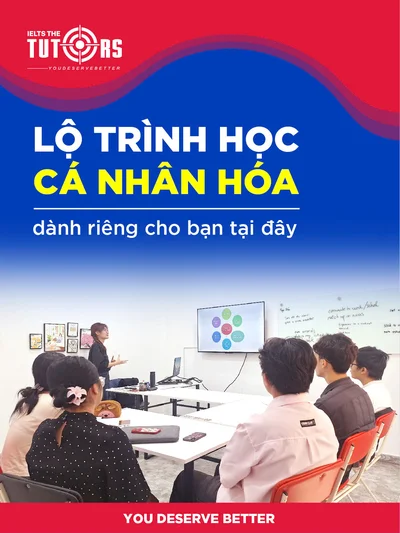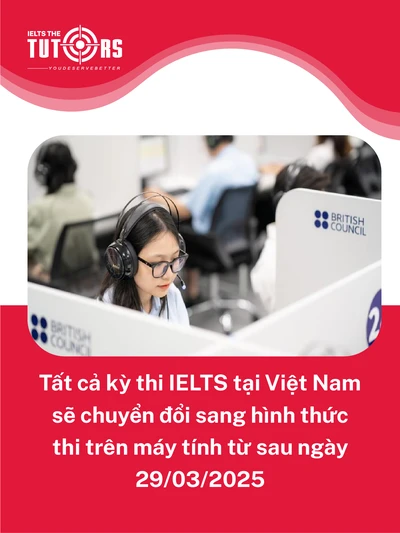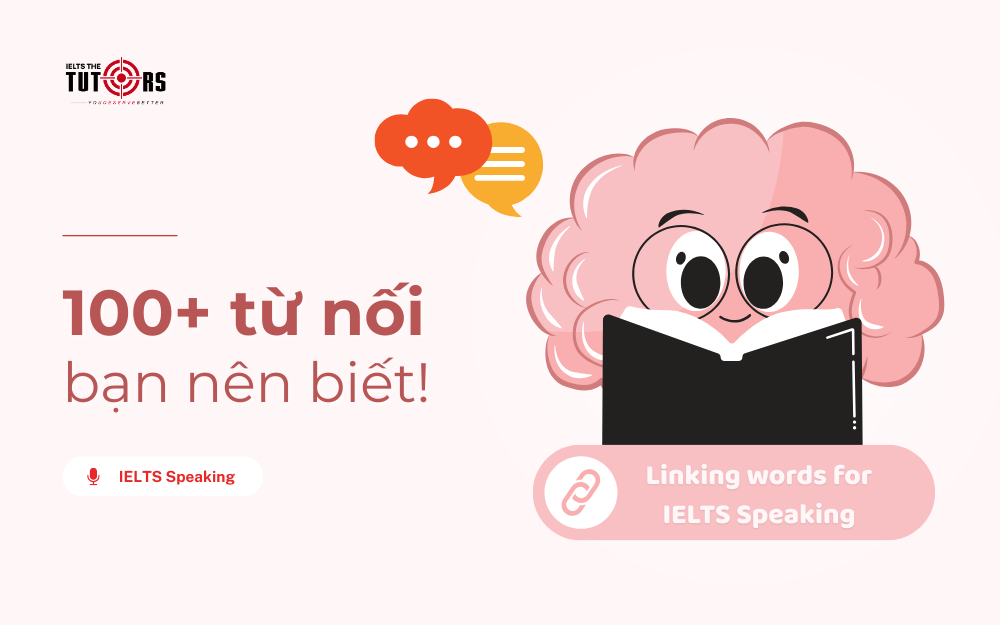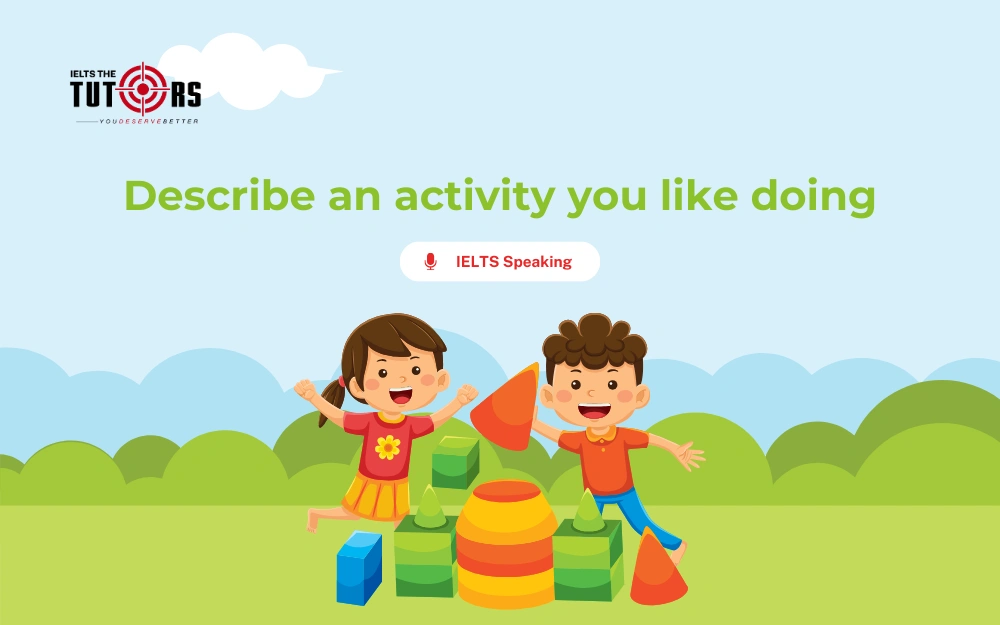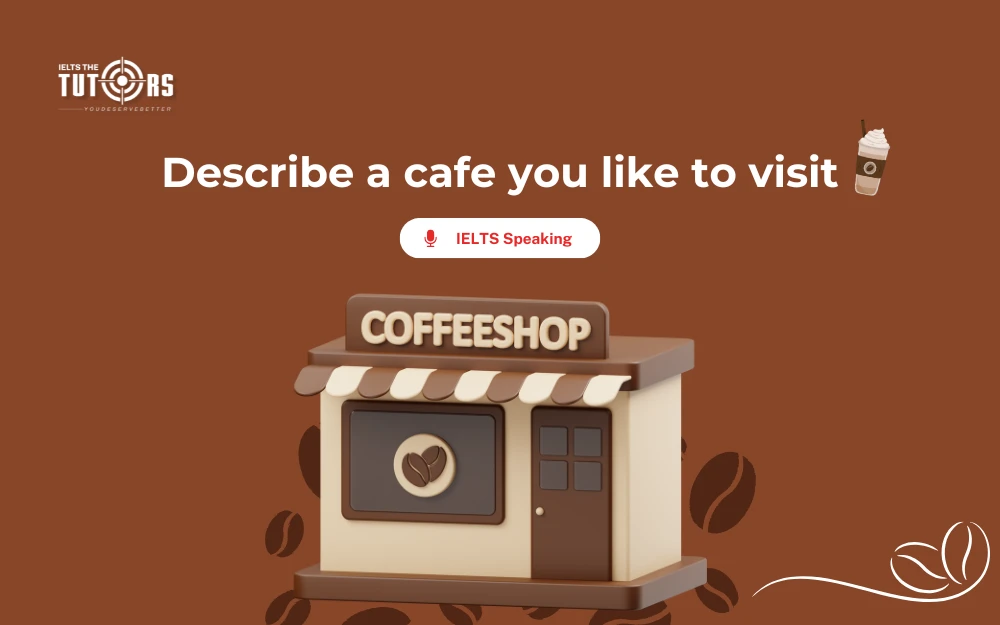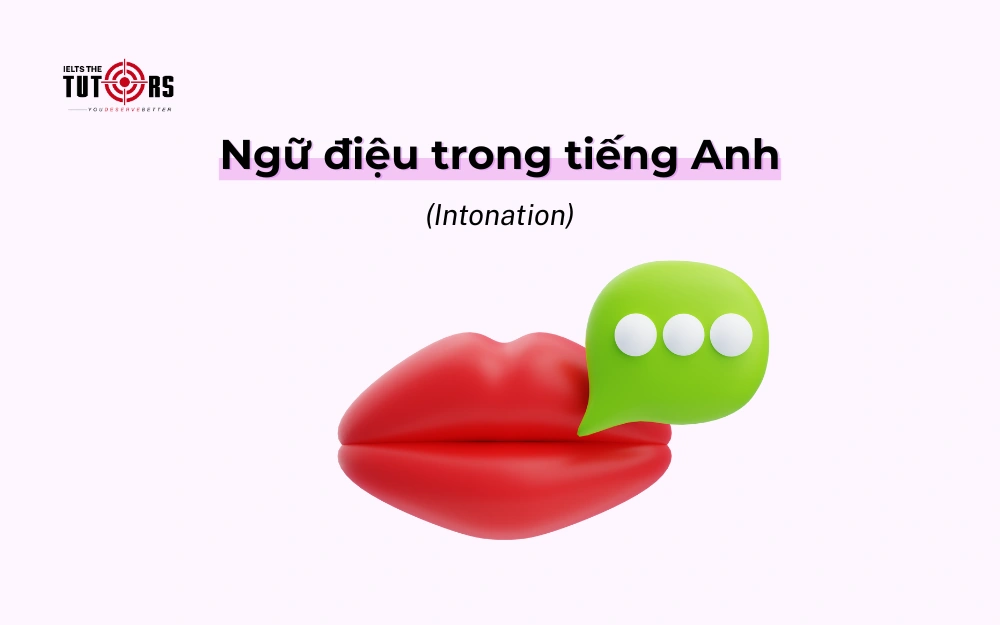Technology là một trong những chủ đề thú vị và phổ biến nhất trong bài thi IELTS Speaking. Đây là chủ đề khá quen thuộc trong cuộc sống hàng ngày, tuy nhiên nếu không có sự chuẩn bị, bạn rất có thể sẽ gặp khó khăn với Technology IELTS Speaking. Cùng IELTS The Tutors giải quyết chủ đề này với Question, Answer, Sample and Vocabulary ăn điểm ngay trong bài viết này nhé!
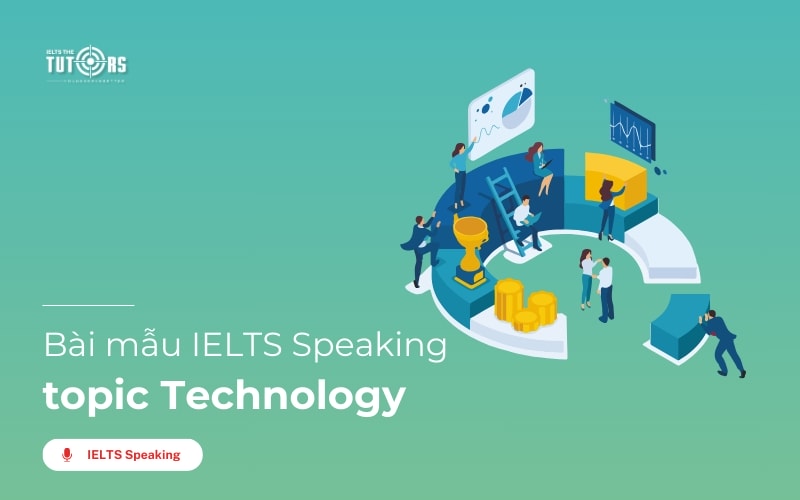
| Key takeaways |
Part 1
Part 2
Part 3
Từ vựng
|
Technology IELTS Speaking Part 1
Chủ đề Technology IELTS Speaking trong Part 1 thường bao gồm các câu hỏi cơ bản để bạn thể hiện sự hiểu biết của mình về công nghệ và cách mà công nghệ ảnh hưởng đến cuộc sống hàng ngày của bạn. Dưới đây là một số câu hỏi thường gặp trong Technology speaking topic phần 1, cùng theo dõi nhé!
Q1: What piece of tech do you usually use in your day-to-day life?
An indispensable piece of hardware that I can't live without is my trusty smartphone. Besides the simple functions of texting and calling, having access to the Internet has become a necessity for extending your knowledge.
Vocabulary:
- Indispensable (adj): thiết yếu, không thể thiếu
- Trusty (adj): đáng tin cậy
- Texting (n): nhắn tin
- Calling (n): gọi điện thoại
- Access (n): quyền truy cập
- Necessity (n): điều cần thiết
- Extending (v): mở rộng
- Knowledge (n): kiến thức
Q2: What technology do you use daily?
I use a variety of technologies daily. My smartphone is indispensable for staying connected with friends and family, checking emails, and browsing the internet. I also use my laptop for work and study, and I rely on my smartwatch to track my fitness activities.
Vocabulary:
- Connected (adj): kết nối
- Track (v): theo dõi
- Fitness (n): thể dục, sức khỏe
Q3: How has technology changed the way you work or study?
A: Technology has revolutionized the way I work and study. With online learning platforms and digital resources, I can access information and courses from anywhere in the world. Tools like video conferencing and collaborative software have made remote work and group projects much more efficient.
Vocabulary:
- Revolutionized (v): cách mạng hóa
- Online learning platforms (n): nền tảng học trực tuyến
- Digital resources (n): tài nguyên kỹ thuật số
- Video conferencing (n): hội nghị video
- Collaborative software (n): phần mềm hợp tác
- Remote work (n): làm việc từ xa
- Group projects (n): dự án nhóm
- Efficient (adj): hiệu quả
Q4: Do you think people rely too much on technology?
In some cases, yes. While technology brings numerous benefits, it can also make us overly dependent. Many people, including myself, find it hard to disconnect from our devices, which can impact our social interactions and overall well-being.
Vocabulary:
- Rely (v): phụ thuộc
- Overly (adv): quá mức
- Dependent (adj): phụ thuộc
- Benefits (n): lợi ích
- Impact (n): tác động
- Social interactions (n): tương tác xã hội
- Well-being (n): sức khỏe, sự an toàn
Technology IELTS Speaking Part 2
Speaking about technology ở Part 2 cũng là một chủ đề được khá nhiều thí sinh quan tâm, dưới đây là một bài mẫu ở band 6.5 do giáo viên nhà IELTS The Tutors hướng dẫn bạn, hãy cùng tham khảo nhé!
Describe a piece of technology that you find useful
- You should say:
- What it is
- How often you use it
- Why you find it useful
Explain how it has improved your daily life
A piece of technology that I find incredibly useful is my smartwatch. It’s a compact device that I wear on my wrist, but it serves multiple purposes beyond just telling the time. I bought it about a year ago after realizing that I needed a more efficient way to track my health and stay organized.
I use my smartwatch daily, and it has become an integral part of my routine. For instance, it helps me monitor my fitness activities like counting steps, tracking calories burned, and even measuring my heart rate. Additionally, it’s synchronized with my smartphone, so I can receive notifications, check messages, and even make quick calls without having to pick up my phone.
What I find most useful about this device is its ability to keep me productive and healthy. It sends me reminders to take short breaks during long work hours and motivates me to stay active by setting daily fitness goals. On top of that, it has a sleep tracker, which has helped me understand my sleeping patterns and make adjustments to improve the quality of my rest.
This smartwatch has improved my daily life significantly. It has streamlined my schedule by reducing my reliance on other devices and made health tracking much more convenient. Moreover, its sleek design and customizable features make it both practical and stylish. I genuinely feel that this small gadget has made a big difference in how I manage my time, stay active, and maintain a balanced lifestyle.
Vocabulary:
- smartwatch (n): đồng hồ thông minh
- compact (adj): nhỏ gọn
- synchronize (v): đồng bộ hóa
- notification (n): thông báo
- calories burned (n): lượng calo tiêu thụ
- heart rate (n): nhịp tim
- fitness goals (n): mục tiêu thể chất
- sleep tracker (n): công cụ theo dõi giấc ngủ
- streamline (v): hợp lý hóa, làm hiệu quả hơn
- customizable (adj): có thể tùy chỉnh
Technology IELTS Speaking Part 3
Q1: Does technology distract people?
Undoubtedly, technology can be a significant source of distraction for people. With the constant notifications from social media, emails, and other apps, individuals often find it challenging to stay focused on their tasks. Additionally, the ease of access to entertainment, such as streaming services and online games, can further divert attention. However, it is worth noting that technology, when used responsibly, can also enhance productivity. The key lies in how one manages and controls their use of technological devices.
Q2: In the future people’s work are heavily affected by technology. Do advantages outweigh the disadvantages?
In the future, technology will certainly impact people's work. While there are some disadvantages, like job displacement due to automation and the loss of human interaction, the benefits outweigh them. Technology increases productivity, allows remote work, and fosters global collaboration. Although some jobs might be replaced, new roles will emerge, focusing more on creativity and innovation. Overall, the advantages of technology in the workplace will drive growth and efficiency.
Vocabulary:
- Job displacement (n): sự thay thế công việc
- Automation (n): tự động hóa
- Productivity (n): năng suất
- Remote work (n): làm việc từ xa
- Collaboration (n): sự hợp tác
- Emerging roles (n): các vai trò mới
- Creativity (n): sự sáng tạo
- Innovation (n): sự đổi mới
- Growth (n): sự phát triển
Q3: What are the advantages and disadvantages of using technology in education?
The advantages of using technology in education are numerous. It provides access to a vast amount of information and resources, enables interactive learning experiences, and facilitates communication between students and teachers. However, there are also disadvantages, such as the potential for distraction, the digital divide between students with different access to technology, and the reliance on devices that can sometimes malfunction.
Vocabulary:
- Resources (n): tài nguyên
- Communication (n): sự giao tiếp
- Distraction (n): sự phân tâm
- Digital divide (n): khoảng cách số
- Reliance (n): sự phụ thuộc
- Malfunction (n): sự cố, hỏng hóc
Q4: How do you think technology will change the way we live in the future?
Technology will continue to transform our lives in many ways. We can expect advancements in AI and automation to make daily tasks more efficient. Smart homes and IoT devices will make our living environments more interconnected and convenient. Additionally, innovations in healthcare technology will likely improve medical treatments and extend life expectancy. However, it is essential to address the ethical and social implications of these changes to ensure that technology benefits everyone.
Vocabulary:
- Efficiency (n): hiệu quả
- Smart homes (n): nhà thông minh
- IoT (Internet of Things) (n): Internet vạn vật
- Interconnected (adj): kết nối với nhau
- Convenient (adj): tiện lợi
- Innovations (n): sáng tạo, đổi mới
- Healthcare (n): y tế
- Ethical (adj): đạo đức
- Social implications (n): tác động xã hội
Q5: What are some potential negative impacts of technology on society?
While technology offers numerous benefits, it also poses potential negative impacts. These include privacy concerns, as personal data is increasingly collected and shared. There is also the risk of job displacement due to automation and AI. Additionally, excessive screen time and reliance on digital devices can lead to health issues such as eye strain, poor posture, and mental health problems like anxiety and depression. Addressing these challenges requires careful consideration and regulation.
Vocabulary:
- Privacy concerns (n): mối lo ngại về quyền riêng tư
- Personal data (n): dữ liệu cá nhân
- Job displacement (n): sự thay thế công việc
- Excessive (adj): quá mức
- Screen time (n): thời gian sử dụng màn hình
- Health issues (n): vấn đề sức khỏe
- Eye strain (n): mỏi mắt
- Posture (n): tư thế
- Mental health (n): sức khỏe tâm lý
- Anxiety (n): lo âu
- Depression (n): trầm cảm
- Regulation (n): quy định
Xem thêm: Bài mẫu chủ đề Sports IELTS Speaking part 1, 2, 3 kèm từ vựng
Tổng hợp từ vựng Technology IELTS Speaking
Từ vựng về thiết bị điện tử (Electronic Devices)
|
Từ vựng |
Phiên âm |
Nghĩa tiếng Việt |
|
Appliance |
/əˈplaɪ.əns/ |
Thiết bị, máy móc |
|
Smartphone |
/ˈsmɑːrt.foʊn/ |
Điện thoại thông minh |
|
Microprocessor |
/ˌmaɪ.krəʊˈprəʊ.ses.ər/ |
Bộ vi xử lý |
|
Laptop |
/ˈlæp.tɑːp/ |
Máy tính xách tay |
|
Tablet |
/ˈtæb.lət/ |
Máy tính bảng |
|
Selfie stick |
/ˈsel.fi ˌstɪk/ |
Gậy hỗ trợ tự chụp ảnh |
|
Smartwatch |
/ˈsmɑːrt.wɑːtʃ/ |
Đồng hồ thông minh |
|
Earbuds |
/ˈɪr.bʌdz/ |
Tai nghe không dây |
|
Wireless headphones |
/ˈwaɪə.ləs/ /ˈhed.fəʊnz/ |
Tai nghe chụp tai không dây |
|
Bluetooth speaker |
/ˈbluː.tuːθ ˈspiː.kɚ/ |
Loa Bluetooth |
|
Gaming console |
/ˈɡeɪ.mɪŋ ˈkɑːn.soʊl/ |
Máy chơi game |
|
Digital camera |
/ˈdɪdʒ.ɪ.t̬əl ˈkæm.rə/ |
Máy ảnh kỹ thuật số |
|
Drone |
/droʊn/ |
Máy bay không người lái |
|
Virtual reality headset |
/ˈvɝː.tʃu.əl riˈæl.ə.t̬i ˈhed.set/ |
Kính thực tế ảo |
Từ vựng về trí tuệ nhân tạo (Artificial Intelligence)
|
Từ vựng |
Phiên âm |
Nghĩa tiếng Việt |
|
Artificial Intelligence (AI) |
/ˌɑːr.t̬əˈfɪʃ.əl ɪnˈtel.ɪ.dʒəns/ |
Trí tuệ nhân tạo |
|
Machine learning |
/məˈʃiːn ˈlɝː.nɪŋ/ |
Học máy |
|
Augmented reality |
/ɔːɡˌmentɪd riˈæl.ɪ.ti/ |
Thực tế tăng cường |
|
Neural network |
/ˈnʊr.əl ˈnet.wɝːk/ |
Mạng nơ-ron nhân tạo |
|
Virtual reality |
/ˌvɜː.tju.əl riˈæl.ɪ.ti/ |
Thực tế ảo |
|
Chatbot |
/ˈtʃæt.bɑːt/ |
Bot trò chuyện |
|
Automation |
/ˌɑː.t̬əˈmeɪ.ʃən/ |
Tự động hóa |
|
Algorithm |
/ˈæl.ɡə.rɪð.əm/ |
Thuật toán |
|
Deep learning |
/diːp ˈlɝː.nɪŋ/ |
Học sâu |
|
Data mining |
/ˈdeɪ.t̬ə ˈmaɪ.nɪŋ/ |
Khai thác dữ liệu |
|
Natural language processing (NLP) |
/ˈnætʃ.ɚ.əl ˈlæŋ.ɡwɪdʒ ˈprɑː.ses.ɪŋ/ |
Xử lý ngôn ngữ tự nhiên |
|
Robotics |
/roʊˈbɑː.t̬ɪks/ |
Ngành robot học |
Từ vựng về Internet và truyền thông (Internet & Communication)
|
Từ vựng |
Phiên âm |
Nghĩa tiếng Việt |
|
Broadband |
/ˈbrɔːd.bænd/ |
Băng thông rộng |
|
Wi-Fi |
/ˈwaɪ.faɪ/ |
Mạng không dây Wi-Fi |
|
Cloud computing |
/klaʊd kəmˈpjuː.t̬ɪŋ/ |
Điện toán đám mây |
|
Social media |
/ˈsoʊ.ʃəl ˈmiː.di.ə/ |
Mạng xã hội |
|
E-commerce |
/ˌiːˈkɑː.mɝːs/ |
Thương mại điện tử |
|
Online streaming |
/ˈɑːn.laɪn ˈstriː.mɪŋ/ |
Phát trực tuyến |
|
Search engine |
/ˈsɝːtʃ ˈen.dʒɪn/ |
Công cụ tìm kiếm |
|
Bandwidth |
/ˈbænd.wɪdθ/ |
Băng thông |
|
Encryption |
/ɪnˈkrɪp.ʃən/ |
Mã hóa |
|
VPN (Virtual Private Network) |
/ˌviː.piːˈen/ |
Mạng riêng ảo |
Từ vựng về các xu hướng công nghệ (Tech Trends)
|
Từ vựng |
Phiên âm |
Nghĩa tiếng Việt |
|
Blockchain |
/ˈblɑːk.tʃeɪn/ |
Chuỗi khối |
|
Cryptocurrency |
/ˌkrɪp.toʊˈkɝː.rən.si/ |
Tiền điện tử |
|
5G technology |
/ˈfaɪv ˈdʒiː/ |
Công nghệ mạng 5G |
|
Smart home |
/ˈsmɑːrt ˈhoʊm/ |
Nhà thông minh |
|
Augmented reality (AR) |
/ɔːɡˈmen.t̬ɪd riˈæl.ə.t̬i/ |
Thực tế tăng cường |
|
Virtual reality (VR) |
/ˈvɝː.tʃu.əl riˈæl.ə.t̬i/ |
Thực tế ảo |
|
Internet of Things (IoT) |
/ˈɪn.t̬ɚ.net əv ˈθɪŋz/ |
Internet vạn vật |
|
Wearable technology |
/ˈweə.rə.bəl tɛkˈnɑː.lə.dʒi/ |
Công nghệ đeo được |
|
Quantum computing |
/ˈkwɑːn.təm kəmˈpjuː.tɪŋ/ |
Điện toán lượng tử |
|
Renewable energy tech |
/rɪˈnuː.ə.bəl ˈen.ɚ.dʒi tɛk/ |
Công nghệ năng lượng tái tạo |
Xem thêm: Tổng hợp collocation theo chủ đề trong bài thi IELTS thường gặp nhất
Chủ đề Technology IELTS Speaking không chỉ phổ biến mà còn thú vị và đầy thách thức. Với sự chuẩn bị kỹ lưỡng về từ vựng và cấu trúc câu, bạn có thể tự tin và gây ấn tượng trong kỳ thi của mình. Hãy luyện tập thường xuyên với các câu hỏi mẫu và từ vựng đã được giới thiệu trong bài viết này để nâng cao kỹ năng Speaking của bạn nhé.
Ngoài ra, nếu bạn muốn cải thiện nhanh chóng khả năng Speaking của mình, hãy tham khảo khóa học IELTS Foundation tại IELTS The Tutors. Tại đây, bạn sẽ được làm quen với phương pháp học cá nhân hóa giúp phát triển kỹ năng một cách toàn diện. Đừng quên đăng ký thi thử IELTS trước đó để được đánh giá miễn phí từ giảng viên 8.0+.

